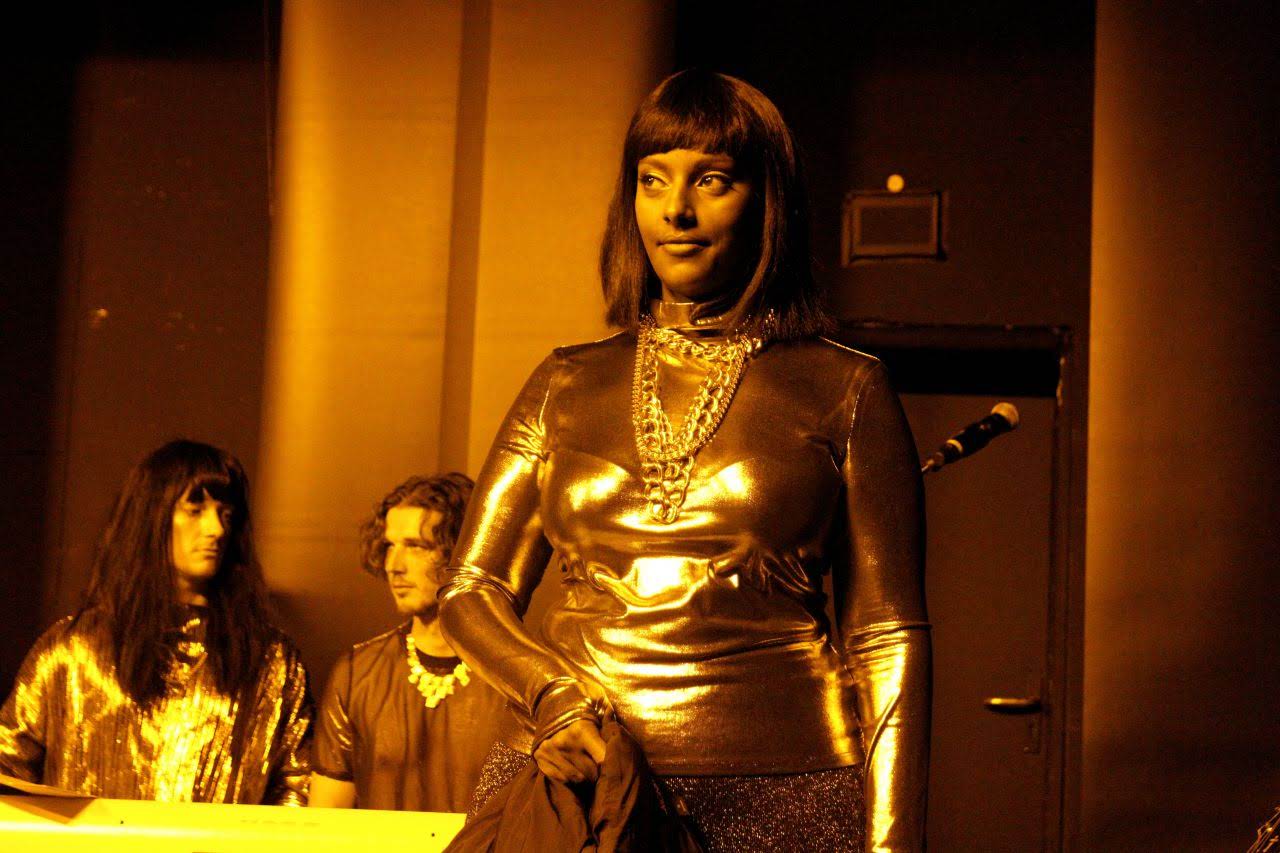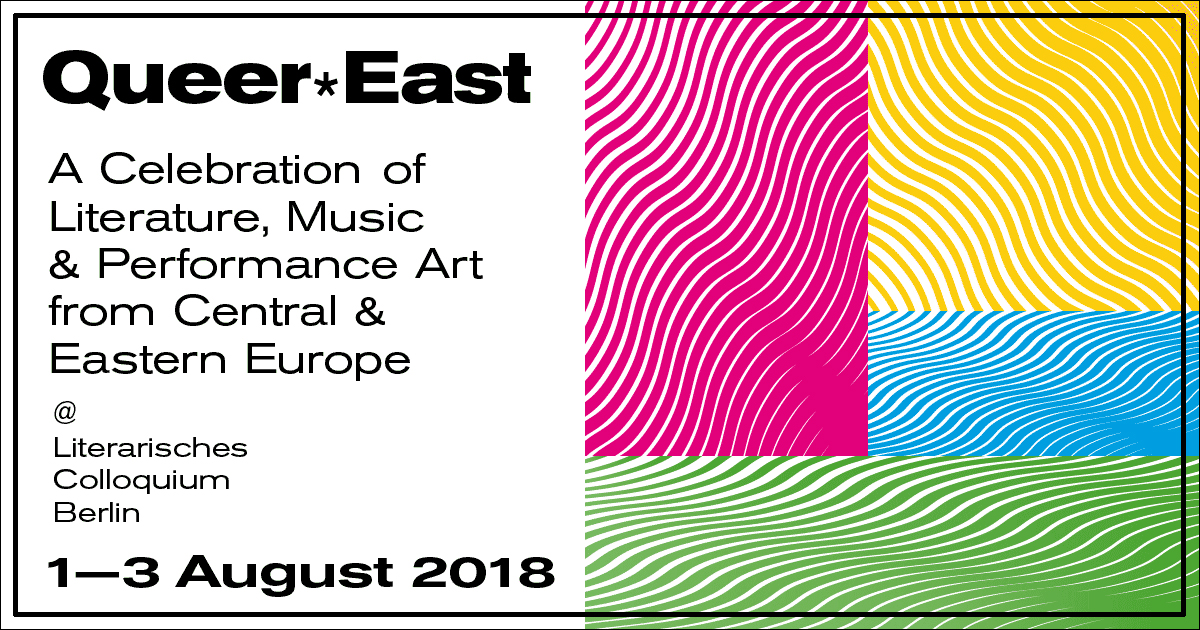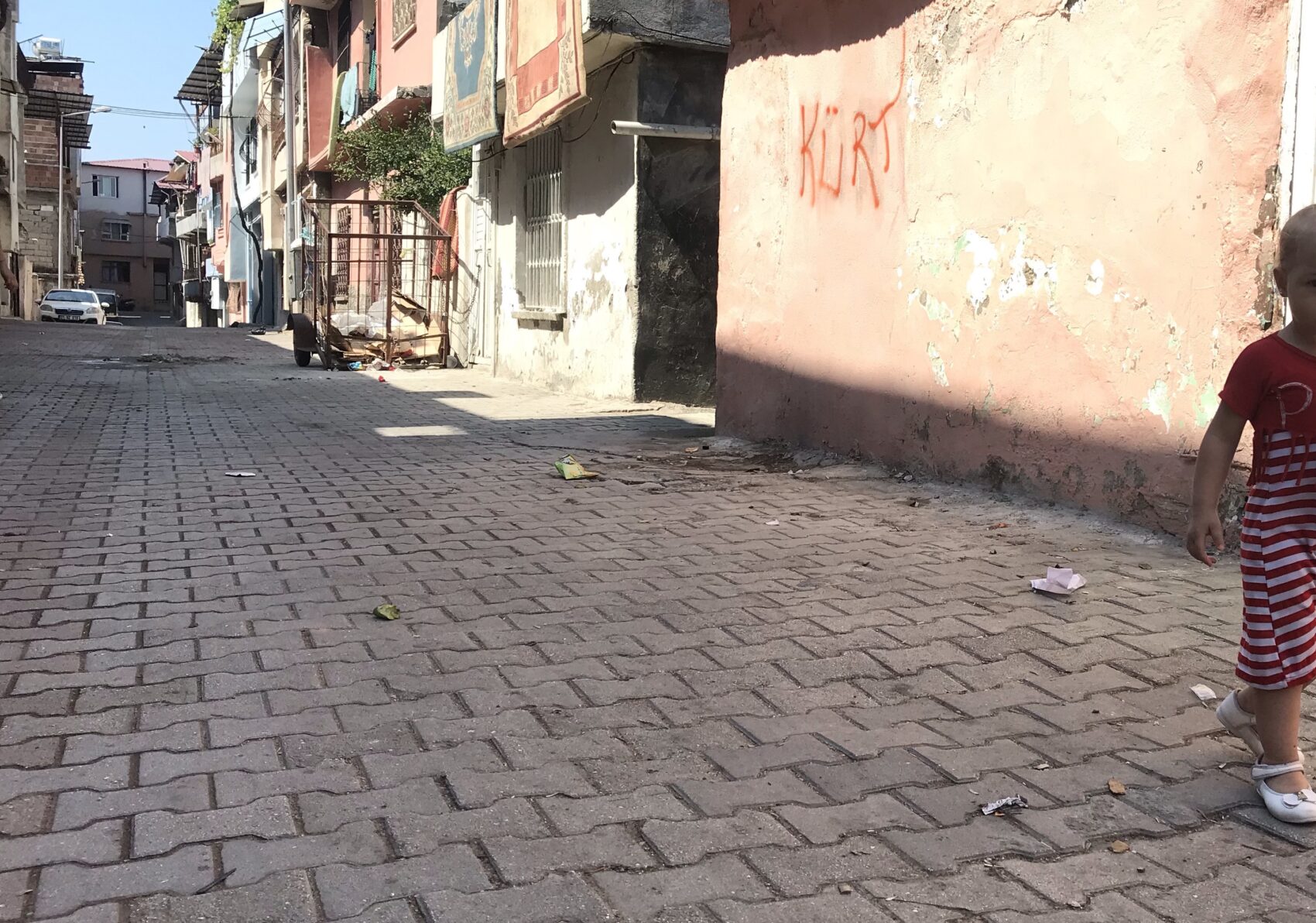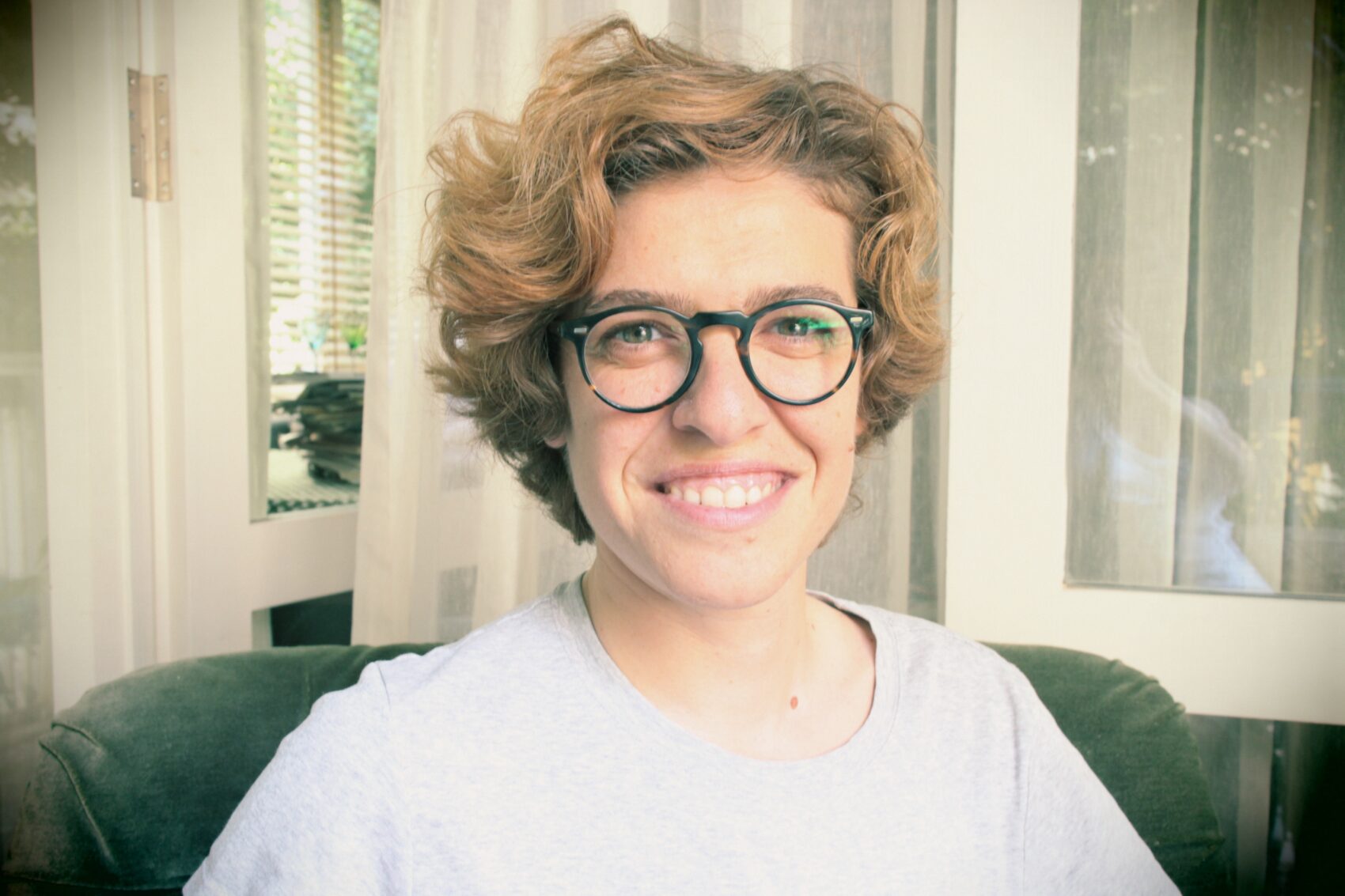İnsan yürürken sadece ileri bakabilir
Yürümeyi seviyorum. Basit bir eylem olan yürümek bu yazıyı okuyan herhangi biri için günlük bir rutinden ibaretken, dünyanın başka bir noktasında ise ifade hürriyetinin bir yolu olabilir. Hatta kendi yaşadığımız şehirlerde de bazıları için bir özgürlük pratiği olabilir.
Belki artık duvarlarımızda “…….. giremez” yazmıyor ama zihinlerde yazdığı sürece duvarlardan indirmiş olmamızın bir anlamı var mı? Nihayetinde bir bedenin nerede rahatça salınabildiği ve nerede salınamadığı politik bir mesele değil mi?
Bu fotoğrafı Antakya’da şehrin merkezinde bulunan Stauris Dağı’na doğru yürürken çektim. Halep şehrine iki saat mesafede en az beş dili ve kim bilir kaç inancı bir arada deneyimleyebileceğiniz sıcak şehrin merkezinde yer alan, yoksul ve yalnız bırakılmış insanların yaşadığı mahallelerden birindeydim.
Sokağa girerken adamın biri “Bayan! girme oraya. Sana göre değil. Şu taraftan daha rahat gidersin.”dedi
“Üstün başın kirlenir.”
Sokak önümde belirmişti ve bilirsiniz insan yürüken sadece ileriye bakabilir.
Yürüdüm.
Bir kız çocuğu belirdi.
Duvarında Kürt yazan sokakta o gün ben ve kız çocuğu sadece yürüdük. Bunu duvardaki yazı, kız çocuğu ve ben bildik.
Beim Laufen kann ein Mensch nur nach vorn schauen
Ich laufe gern. Laufen ist eine einfache Handlung und für die meisten Menschen, die diesen Text lesen, alltägliche Routine. An einem anderen Ort dieser Welt kann sie ein Weg zur Ausdrucksfreiheit sein. Selbst in den Städten, in denen wir leben, kann Laufen für manche von uns eine Praxis der Freiheit sein.
Auf unseren Wänden steht nicht mehr „Kein Zutritt für…“, aber solange es noch in den Köpfen steht, macht es keinen großen Unterschied, dass es von den Wänden verschwunden ist.
Ist es nicht letztlich eine politische Frage, wo sich ein Körper gehen lassen kann und wo nicht?
Dieses Foto hab ich geschossen, während ich auf den Berg Stauris zulief. Er befindet sich mitten in der Stadt Antakya. Antakya ist zwei Stunden von Aleppo entfernt. Es ist heiß in der Stadt und man kann das Zusammenleben von mindestens fünf Sprachen und wer weiß wie vielen Glaubensrichtungen hier erfahren. Ich befinde mich in einem der innerstädtischen Bezirke, in denen arme und sich selbst überlassene Menschen leben.
Als ich in eine Straße einbiege, ruft mir ein Mann hinterher: „Meine Dame! Geh nicht da lang. Das ist nichts für dich. Nimm den anderen Weg, er ist angenehmer.“
„Du wirst dort ganz schmutzig werden.“
Die Straße lag aber schon vor mir und wie Sie wissen, kann ein Mensch beim Laufen nur nach vorne schauen.
Ich sah ein kleines Mädchen.
An einer Wand dieser Straße stand „Kurden“ und das Mädchen und ich liefen einfach nur, an jenem Tag. Nur das Wort an der Wand, das Mädchen und ich wussten davon.
Übersetzung: Oliver Kontny
When you’re walking, you can only look ahead
I love walking. The simple act of walking is, for most of you, nothing more than part of your daily routine, yet in other parts of the world it may represent a form of freedom of expression. And even in the very cities in which we live, for some walking may well be a liberating act.
Our walls may no longer be sprayed with the words “——- not welcome” but when these words remain written in our minds, what difference does it make if they have been removed from our walls?
After all, the issue of where a body can freely wander and where it cannot is a political one, is it not?
I took this photograph while walking towards Mount Stauris, which rises from the centre of Antakya. I was in a poor and neglected neighbourhood of this scorching city — just two hours from Aleppo — where you can encounter at least five languages and innumerable different faiths in the one place.
I had just started down the street when a man said to me, “Miss! Don’t go that way. It’s no place for someone like you. Better to go this way.”
“It’s too dirty for you down there.”
The street had appeared before me and, as you know, when you’re walking you can only look ahead.
I walked.
A young girl appeared.
In that street with the word “Kurd” sprayed on the wall, the girl and I just walked. The only ones who knew about it were the word on the wall, the girl, and me.
Translation: Kate Ferguson
Dema mirov dimeşe tenê dikare li pêş binêre
Ji meşê hez dikim. Ji bo yên ku vê nivîsê bixwînin, dibe ku meşa xwezayî ji tevgera rûtîneke rojane pêk tê, lê ji aliyê din ve dibe ku li devereke din a dinyayê rêyeke azadiya derbirînê be. Heya dibe ku ji bo me hinekan li bajarên ku em lê dijîn jî bibe pratîkeke azadiyê.
Belkî êdî li dîwarên me “…….. qedexe ye” nanivîse lê heta ku di hiş û aqilan de hebe, gelo tu wateya wê heye ku ji dîwaran hatibe daxistin yan na?
Taliya talî, beden li ku derê bi rehetî bilive yan nelive, ma ne mijareke polîtîk e?
Min ev wêne li navenda bajarê Antakyayê ku du saet dûrî Helebê ye û tê de bi kêmanî pênc ziman û çendîn bawerî hene, dema ber bi Çiyayê Stauris ve diçûm, kişand. Ez li taxek ji taxên navendî ya bajarê germ bûm ku şêniyên wê tenê û xizan hatibûn hiştin.
Wexta ketim kuçeyê zilamekî got, “Xatûn! nekeve wê derê. Ne li gorî te ye. Di vî aliyî re tu yê karibî bi rehetî biçî.”
“Dê daw û delingên te bilewitin.”
Ji nişka ve ew sikak derketibû pêşiya min û wek tê zanîn, dema mirov dimeşe tenê dikare li pêş binêre. Ez meşiyam. Keçikek derket pêşiya min.
Wê rojê, ew kuçeya ku ez û keçikê te da meşiyan li diwarê wê Kurd hatibû nivîsîn. Ji xeynî min û keçikê tu kes bi vê yekê nehesiya.
Werger: Mevlüt Oğuz
ينظر الإنسان إلى الأمام فقط أثناء المشي
أنا أحب المشي . يمكن أن يكون المشي ، إجراء بسيط ، روتينًا يوميًا لأي شخص يقرأ هذا المقال ، ولكن يمكن أن يكون وسيلة لحرية التعبير في أي مكان آخر في العالم. حتى في
بعض المدن التي نعيشها ، قد تكون بالنسبة للبعض ممارسة للحرية.
ربما لايكتب في جدراننا بعد الآن’’ …………. لايدخل‘‘لكن هل له معنى من أن نكون قد أزلناه من الجدران ولطالما هو مكتوب في عقولنا؟
وفي النهاية أليست قضية سياسية حيث أين يمكن أن يتأرجح الجسم بأريحية وأين لا يمكن؟
التقطت هذه الصورة أثناء السير باتجاه جبل ستوريس في وسط المدينة في أنطاكيا
كنت في أحد الأحياء الفقيرة والوحيدة في قلب المدينة الدافئة حيث يمكنك تجربة خمس لغات على الأقل ومن يدري كم من المعتقدات تقع على بعد ساعتين من حلب.
عندما دخلت الى الشارع ، قال رجل ، „آنسة! لا تذهبي الى هناك. ليس مناسب لك. بهذا الإتجاه تستطيعين الذهاب بأريحية .
‘‘.
’’يتسخ رأسك وثيابك‘‘
الشارع كان ظاهرأمامي ، وكما تعلم ، لا يمكن للمرء سوى النظر إلى الأمام أثناء المشي. مشيت.
ظهرت فتاة صغيرة.
في ذلك اليوم ، مشينا فقط أنا والفتاة الصغيرة في الشارع الذي كان يكتب على حائطه كلمة الكردي.لا أحد علم بذلك سوى الكتابة الموجودة على الحائط ,الفتاة الصغيرة وأنا.
المترجمة : سميرة عبدو
Share
-
19 Dienstag
19:30 UhrKrieg im Frieden. Dramatische Lesungen II
»will you come with me?«
Ebru Nihan Celkan»Attentat oder Frische Blumen für Carl Ludwig«
Mehdi Moradpour
-
01 Samstag
Krieg im Frieden – Internationales Dramatiker·innenlabor
Das Internationale Dramatiker·innenlabor bietet renommierten Theaterautorinnen und -autoren einen sprachen- und länderübergreifenden Schreib-, Reflexions- und Entwicklungsraum zu aktuellen gesellschaftlichen Themen.

-
26 Freitag
Krieg im Frieden. Szenische Lesungen
Szenische Lesung mit Texten von Ebru Nihan Celkan (Istanbul), Sivan Ben Yishai (Tel Aviv), Anastasiia Kosodii (Zaporizhzhya) und Mehdi Moradpour (Berlin)

-
01 Mittwoch
Queer*East
Literatur, Musik und Performance aus Mittel-, Ost- und Südosteuropa

-
01 Mittwoch
Queer*East
Ein Festival mit Literatur, Musik Performance aus Mittel-, Ost- und Südosteuropa

Veranstaltungen mit Ebru Nihan Celkan
2019
Februar
2018
Oktober
August












